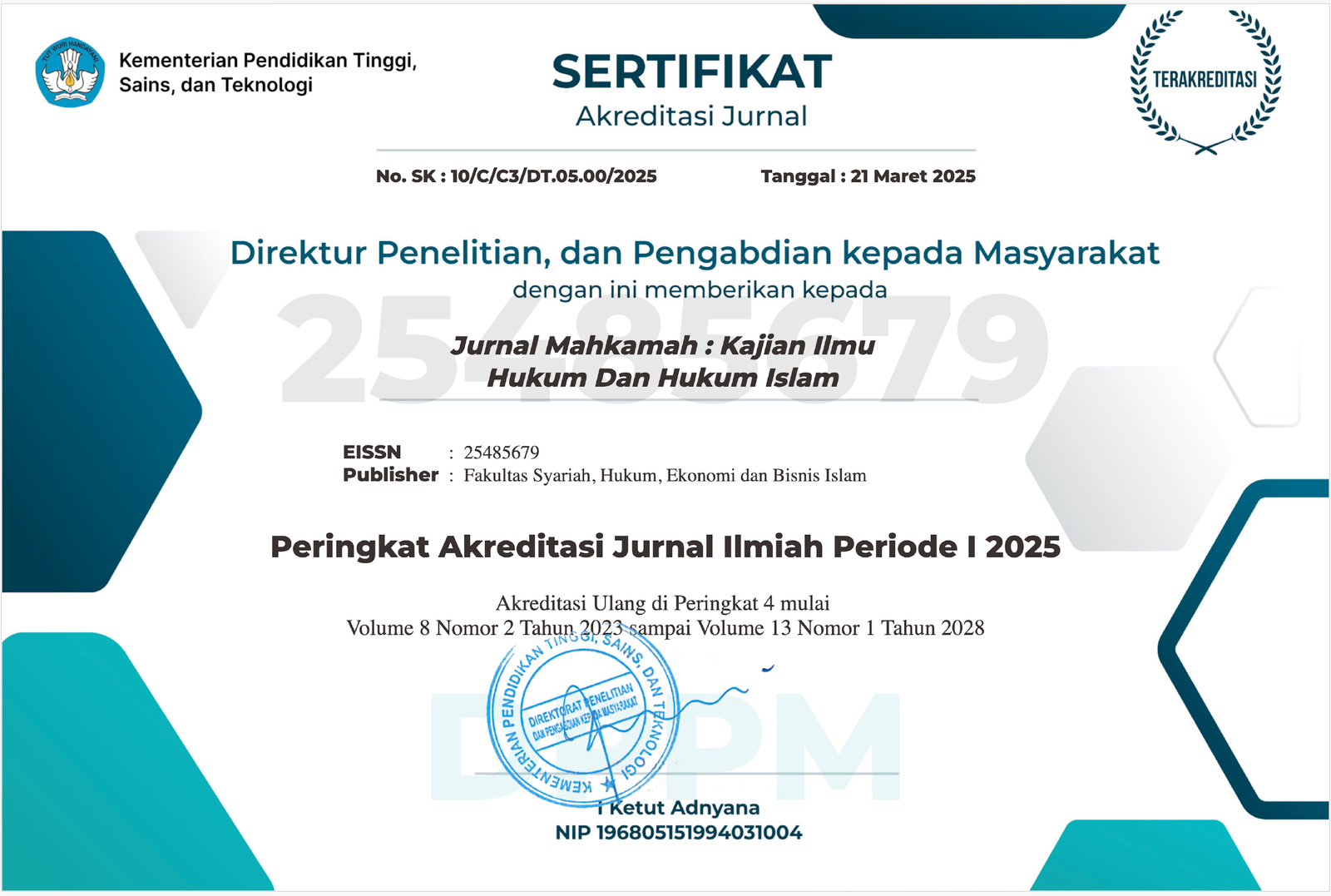Potrait Legal Protection Women’s Human Rights Through the Establishment of Gender Mainstreaming Local Regulations
DOI:
https://doi.org/10.25217/jm.v7i2.2726Keywords:
gender equality, gender mainstreaming, legal protectionAbstract
Human rights are basic rights inherent in every human being, including women. However, the stigmatization of women, which often makes the appearance of women's human rights limited, makes it difficult for them to develop themselves. Based on data from the UNDP Gender Inequality Index, Indonesia occupies the highest score in ASEAN with a gender inequality percentage of 48%. The participation of women in development is one of the reasons for the high preference for gender. The government has made various efforts to improve the dignity of women, one of which is through gender mainstreaming. In the context of decentralization, local governments need to elaborate on gender mainstreaming policies in local regulations as an effort to protect women's human rights laws in the regions. This paper aims to portray legal protection through gender mainstreaming within the framework of regional autonomy. The results of the study show that: first, local governments have the authority and responsibility in realizing gender-responsive regional development, both based on local government legal regimes and sectoral legal regimes. Regional autonomy should be able to address gender in accordance with the locality of the region. Second, gender mainstreaming is a necessity as well as a challenge for local governments, in the optics of law as a means of development, regional regulations regarding gender mainstreaming become the juridical basis for regions to ensure and realize conditions of gender equality at the regional level; increasing the contribution and role of women in the regions; and encourage gender-responsive regional development as a form of efforts to protect and fulfill women's rights.
References
Bagir Manan, Fungsi dan Materi Peraturan Perundang-Undangan, Jakarta: 1993.
Dina Martiany, Implementasi Pengarusutamaan Gender (Pug) Sebagai Strategi Pencapaian Kesetaraan Gender (Studi Di Provinsi Sumatera Utara Dan Jawa Tengah), Aspirasi Vol. 2 No. 2, Desember 2011.
Fakih, M. (2006). Analisis Gender dan Transformasi Sosial. Yogyakarta: Pustaka Pelajar.
Heri Afriady Firman, Rahmiati, Pengarusutamaan Gender Dalam Pemerintahan Daerah, Iyasatuna, Volume 2 Nomor 1 Januari 2020.
Indra Kusumawardhana & Rusdi J. Abbas, Indonesia Di Persimpangan: Urgensi “Undang-Undang Kesetaraan Dan Keadilan Gender” Di Indonesia Pasca Deklarasi Bersama Buenos Aires Pada Tahun 2017, Jurnal Ham Vol. 9 No. 2, Desember 2018.
International Planned Parenthood Federation. http://www.ippf.org/en/Resources/Articles/What+is+gender+equality.htm
Khofifah Indah Parawansa, Mengukur Paradigma Menembus Tradisi, LP3ES, Jakarta, 2006.
Maidin Gultom, Perlindungan Hukum Terhadap Anak dan Perempuan, cet.4, (Bandung: PT RefikaAditama, 2018)
Mansour Fakih, Analisis Gender dan Transformasi Sosial. Yogyakarta: INSISTPress, 2008.
Muhammad Busyrol Fuad, Reformulasi Norma Hak Dan Kewajiban Suami Istri Dalam Hukum Keluarga Di Indonesia (Sebuah Upaya Pengarusutamaan Gender dalam Pembaharuan Undang-undang Nomor 1 Tahun 1974 Tentang Perkawinan)
Raharjo, Yulfita. (1991), Perbedaan Antara Studi Wanita Dalam Pembangunan Dan Studi Wanita dalam Setyawati, Lugina. Anastasia Endang, Pengembangan Studi Wanita Dan Pembangunan. Jakarta: Proyek Studi Gender dan Pembangunan FISIP UI.
Riant.D. Nugroho, Gender dan Strategi Pengarusutamaannya di Indonesia. Yogyakarta: Pustaka Pelajar, 2008.
Santrock, J. W. (2002). Life Span Development: Perkembangan Masa Hidup. Jakarta: Erlangga.
Siti Azizah, (2002) Konsep Gender dan Aplikasinya.
Soemartono, Triyuni. Peran Pemerintah Dalam Pemberdayaan Perempuan. Yayasan Budi Arti, 2014.
Tim Penyusun, Kajian Penghitungan Indeks Ketimpangan Gender 2021, (Jakarta: BPS RI, 2021).
Trisakti Handayani & Wahyu Widodo, Konsep Dasar Implementasi Pengarusutamaan Gender Pada Pendidikan Keaksaraan Fungsional Di Propinsi Jawa Timur, Jurnal Humanity.
Wewen Kusumi Rahayu, Analisis Pengarusutamaan Gender dalam Kebijakan Publik, Jurnal Analisis dan Pelayanan Publik Volume 2, Nomor 1, Juni 2016.
Widjajanti M. Santoso, Problematika Kebijakan Pengarusutamaan Gender dalam Mengatasi Marjinalisasi Perempuan, Jurnal Masyarakat & Budaya, Volume 16 No.3 Tahun 2014
Downloads
Published
Versions
- 2023-02-21 (2)
- 2022-12-27 (1)
How to Cite
Issue
Section
License
Copyright (c) 2022 Malicia Evendia, Ade Arif Firmansyah; Ulinnuha Saifullah

This work is licensed under a Creative Commons Attribution-ShareAlike 4.0 International License.
This work is licensed under a Creative Commons Attribution-ShareAlike 4.0 International License.
Authors retain copyright and grant the Jurnal Mahkamah : Kajian Ilmu Hukum Dan Hukum Islam right of first publication with the work simultaneously licensed under a Creative Commons Attribution License (CC BY-SA 4.0) that allows others to share (copy and redistribute the material in any medium or format) and adapt (remix, transform, and build upon the material) the work for any purpose, even commercially with an acknowledgment of the work's authorship and initial publication in Jurnal Mahkamah : Kajian Ilmu Hukum Dan Hukum Islam.
Authors are able to enter into separate, additional contractual arrangements for the non-exclusive distribution of the journal's published version of the work (e.g., post it to an institutional repository or publish it in a book), with an acknowledgment of its initial publication in Jurnal Mahkamah : Kajian Ilmu Hukum Dan Hukum Islam.
Authors are permitted and encouraged to post their work online (e.g., in institutional repositories or on their website) prior to and during the submission process, as it can lead to productive exchanges, as well as earlier and greater citation of published work (See The Effect of Open Access).









